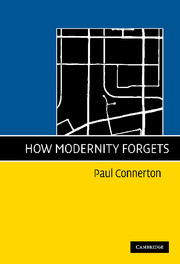5 - Conclusion
Published online by Cambridge University Press: 05 July 2015
Summary
A number of doubts and queries will have been formed in the reader's mind with respect to the argument I have been developing. I shall now attempt to answer some of those which are foreseeable.
First of all, it may be asked, when precisely did this process of cultural forgetting emerge as a ‘break’ or ‘rupture’ to which it is possible to point as being unquestionably more important than any other? What has occurred is in fact a concatenation of ‘ruptures’. To some degree, of course, my argument presupposes the classic Marxist account which places the most crucial break about 1800 onwards. But with respect to the emergence of the giant city and, a less important feature, the mass circulation of newspapers, a date about a century later, around 1900, and onwards, is a significant chronological marker. Yet again, the emergence of megacities, the increasing importance of electronic media and the development of information technology imply a date from about the middle of the twentieth century onwards, or even later still, as a significant further step-change. Overall, the process of cultural forgetting characteristic of modernity is accelerating and marked by a concatenation of step-changes.
Then again, it may be asked, where did this process of forgetting happen? My argument obviously implies that forgetting has become a problem for humanity in general, yet it is also equally clear that the process started earlier and has gone much further in some parts of the globe than in others. The answer to the question ‘when?’ is only possible to formulate if certain crucial differences are acknowledged. The rate at which Americans, both North and South, tear down buildings, for example, differs considerably from what Italians, or even the British, do to them.
Then again, it may be asked, to whom did this cultural forgetting happen and to whom does it now happen?
- Type
- Chapter
- Information
- How Modernity Forgets , pp. 132 - 147Publisher: Cambridge University PressPrint publication year: 2009



